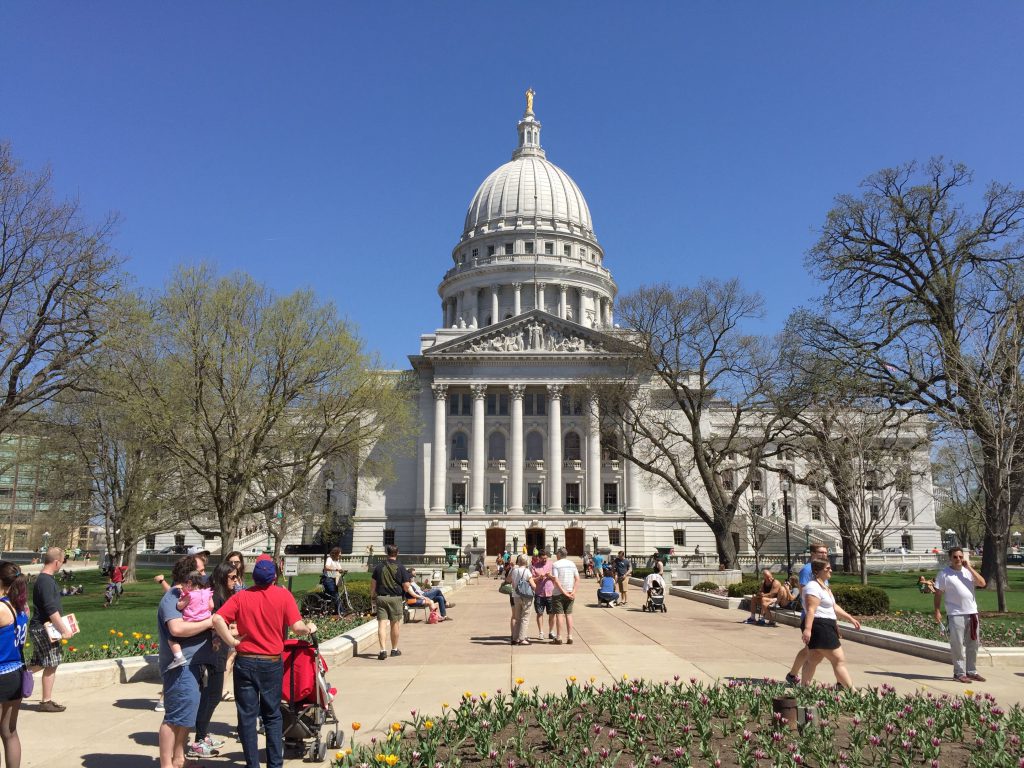State Surplus Will Help in Crisis
Evers veto of Republican tax cut saves expected surplus, means less financial stress.
When Democratic Gov. Tony Evers vetoed the Republicans’ package of $392 million in tax cuts and debt payoff, he had no way of knowing how soon elected officials in the Capitol would need that cash.
That $392 million is now a COVID-19 virus cushion that elected officials could use to:
*Pay for any virus-relief package that Evers and Republican legislative leaders began talking about last week.
*Offset any decline in state tax collections resulting from a recession triggered by closing down much of the nation’s economy to fight the virus.
The economic lockdown triggered by COVID-19 means state government will not collect the additional $818 million in taxes by mid-2021 that the Legislative Fiscal Bureau (LFB) predicted in January.
The LFB’s uber-cautious director, Bob Lang, told wispolitics.com last week that he would watch tax collections for several months before revising the agency’s estimates of income during the current two-year budget cycle. “I’m not going to do [new revenue estimates] every two weeks,” Lang added.
How far, for example, will tax collections fall from January estimates? Will payments of jobless benefits push the fund that pays those benefits into the red? Should state government supplement federal government payments to individuals and families? How does state government help K-12 students losing months of classroom instruction? Can Evers and Republican legislative leaders agree on a bipartisan virus-response package?
Aides to Evers and those GOP leaders used the same diplomatic term — “productive” — to summarize their initial teleconferences last week on the crisis.
“We look forward to working together to protect the health and safety of Wisconsinites and begin our economic recovery,” said Evers aide Melissa Baldauff.
“We agreed to commence daily conversations,” Senate Majority Leader Scott Fitzgerald and Assembly Speaker Robin Vos said in a joint statement. “We all want to do what’s best for our citizens and businesses during these unprecedented and demanding times.”
Over the weekend, all four top Republican legislative leaders issued a statement agreeing with Evers that no mandatory “stay home” order was needed. But Evers has since changed his mind, and has announced the order will be issued tomorrow.
Evers didn’t veto the GOP tax cut and debt payoff package on Feb. 26 to keep cash in reserve for a COVID-19 relief package. He wanted the $392 million to go to K-12 schools; Republicans put an income and personal property tax cut, and $100 million in debt paydown, on his desk.
It’s interesting to look at how past Wisconsin tax cuts came before other national emergencies. For decades, elected officials have cut taxes only to have to deal with recessions or disasters.
In 1979 — before the national recession of 1980 — then-Republican Gov. Lee S. Dreyfus and lawmakers approved two tax cuts: The $230-million suspension of withholding income taxes from paychecks for two months, and a $95-million refund of property taxes.
But it was the Great Recession of 2007-09 that put state government — and then-Democratic Gov. Jim Doyle — through a devastating wringer.
When the economy collapsed, Wisconsin income tax collections fell by 13.5 percent – or $810 million – in one year. Income tax collections fell the next year, but by only 3.4 percent, according to LFB records.
Doyle, and Democrats who controlled the Legislature, had no choice but to pass a painful state budget that cut programs and used one-time federal “stimulus” cash to keep the lights on. Unlike this year, there was no surplus hedge against future emergencies.
After passing that “bad news” budget in 2009, what happened to Democrats in the November 2010 election? Doyle chose to not seek re-election. Republican Gov. Scott Walker was elected. And Republicans took control of the Legislature – control they have had for 10 years.
The uncertainty of the COVID19 emergency, and its duration, prompted Evers to make this appeal last week: “Be kind to one another and support one another. We’re in this together, Wisconsin.”
Steven Walters is a senior producer for the nonprofit public affairs channel WisconsinEye. Contact him at stevenscotwalters@gmail.com
If you think stories like this are important, become a member of Urban Milwaukee and help support real, independent journalism. Plus you get some cool added benefits.
More about the Coronavirus Pandemic
- Governors Tony Evers, JB Pritzker, Tim Walz, and Gretchen Whitmer Issue a Joint Statement Concerning Reports that Donald Trump Gave Russian Dictator Putin American COVID-19 Supplies - Gov. Tony Evers - Oct 11th, 2024
- MHD Release: Milwaukee Health Department Launches COVID-19 Wastewater Testing Dashboard - City of Milwaukee Health Department - Jan 23rd, 2024
- Milwaukee County Announces New Policies Related to COVID-19 Pandemic - David Crowley - May 9th, 2023
- DHS Details End of Emergency COVID-19 Response - Wisconsin Department of Health Services - Apr 26th, 2023
- Milwaukee Health Department Announces Upcoming Changes to COVID-19 Services - City of Milwaukee Health Department - Mar 17th, 2023
- Fitzgerald Applauds Passage of COVID-19 Origin Act - U.S. Rep. Scott Fitzgerald - Mar 10th, 2023
- DHS Expands Free COVID-19 Testing Program - Wisconsin Department of Health Services - Feb 10th, 2023
- MKE County: COVID-19 Hospitalizations Rising - Graham Kilmer - Jan 16th, 2023
- Not Enough Getting Bivalent Booster Shots, State Health Officials Warn - Gaby Vinick - Dec 26th, 2022
- Nearly All Wisconsinites Age 6 Months and Older Now Eligible for Updated COVID-19 Vaccine - Wisconsin Department of Health Services - Dec 15th, 2022
Read more about Coronavirus Pandemic here
The State of Politics
-
A Wisconsin Political Trivia Quiz
 Dec 15th, 2025 by Steven Walters
Dec 15th, 2025 by Steven Walters
-
The Fight Over Wisconsin’s House Districts
 Dec 8th, 2025 by Steven Walters
Dec 8th, 2025 by Steven Walters
-
The Battle Over On-Line Betting
 Nov 24th, 2025 by Steven Walters
Nov 24th, 2025 by Steven Walters






















